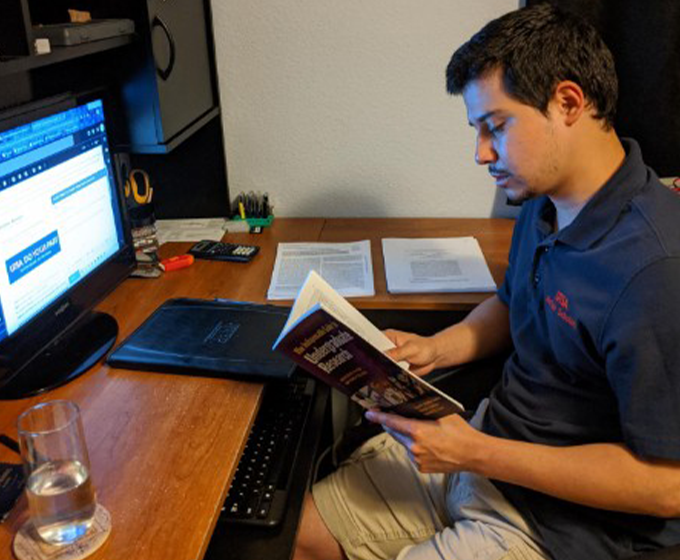Roadrunners continue undergraduate research while studying virtually
UTSA #UTSA


Engineering major Joseph Galloway says he faced challenges working from home but found success and satisfaction.
SEPTEMBER 11, 2020 — When the university shifted mid–spring semester to fully remote learning in response to the COVID-19 global pandemic, Roadrunners conducting and supporting undergraduate research efforts pivoted quickly to continue their scholarly work.
UTSA recognizes undergraduate research as a high-impact practice that helps prepare students for success, with increased student-faculty interaction opening opportunities for mentorship and career planning advisement. Offering undergraduate students meaningful research opportunities is an important component of UTSA’s Classroom to Career Initiative, which focuses on providing more students with experiential learning opportunities during their academic journey at UTSA.
One program at UTSA focused on undergraduate research is the Ronald E. McNair Post-baccalaureate Achievement Program. It is designed to prepare undergraduate students for doctoral studies through involvement in research and other scholarly activities. McNair participants are either first-generation college students with financial need, or members of a group that is traditionally underrepresented in graduate education and have demonstrated strong academic potential.
“Although it was challenging, I had a lot of fun and still learned a tremendous amount.”
McNair scholar Joseph Galloway, a mechanical engineering major, learned that working from home could present challenges for research as he worked with Patrick Benavidez, a lecturer in the Department of Electrical and Computer Engineering on a project involving multirobot construction systems.
“It was definitely challenging trying to keep up with all of the assignments while staying home with so many distractions,” Galloway said. “My internet would cut out every once in a while during meetings and seminars, and I had to spend a lot of my time helping my family members with technical issues.”
Despite the challenges, Galloway found his research to be a great experience. “Although it was challenging, I had a lot of fun and still learned a tremendous amount,” he said.
Research teams demonstrated adaptability and creativity to find ways to continue their work remotely.
Another McNair scholar, Paulina Salinas, also had a positive experience over the summer with the McNair Scholars Summer Program. She worked under assistant professor Guenevere Chen’s Cybersecurity and Cloud Research Lab, studying cybersecurity in electric vehicle charging systems with another undergraduate student and two graduate students.
“We worked on the project this summer through weekly team meetings using Webex,” Salinas said. “For the project, one of the graduate students took the items we ordered online to their home and set up the test bed as we all collaborated and brainstormed to connect the items and make the project work.”
Provost’s Undergraduate Research Fellow John Long worked with kinesiology assistant professor Tianou Zhang this summer, focusing on secondary research using already existing data.
“I am Dr. Zhang’s reader-grader for his exercise nutrition course, so we speak on a frequent basis,” Long said. “Since I’m an undergraduate student, research labs were not available for me, so I had to conduct secondary research, specifically a systematic review. I met with him periodically for guidance on both conducting the necessary research for a systematic review as well writing a systematic review.”
Undergraduate students at UTSA continue to have multiple opportunities to get involved with research. Students can now access the Student Opportunity Center through UTSA’s Office of Undergraduate Research. This free service allows students to access the nation’s largest database for honors and undergraduate research opportunities. UTSA faculty are encouraged to submit their research opportunities to the SOC.
The Office of Undergraduate Research was created in 2013 to engage and promote research opportunities for UTSA undergraduates in all academic disciplines. For more information, visit the Office of Undergraduate Research website or contact Darrell.Balderrama@utsa.edu.